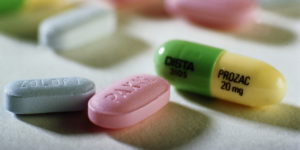Do you remember drawing Xs on your bug bites as a little kid because someone told you it would stop the itching? Do you remember this bizarre ritual actually working? If so, you have had first hand experience with the placebo effect.
The Xs you drew on your bug bites had no medicinal effect, but it was your belief treatment that caused you to experience beneficial results. Placebos in experiments are used to make sure that whatever is actually being tested is in itself producing an effect rather than the power of mental persuasion. Typically, clinical drug trials are done as double blind experiments, where both groups don’t know if they are receiving the placebo or drug. Everything is done exactly the same in both groups and the only difference is that one group’s treatment is biologically inactive, while the other group receives the drug of interest. If the non-placebo group has a significant difference in results from the placebo group then that drug is thought to have an effect, and if that change is overall positive, on target, and shows a high therapeutic index, then that drug is thought to be successful.
The placebo effect has a larger impact on the mind than drug companies want you to know. Drug companies have the power to withhold findings from the public. They generally have the ability to pick and choose the information they want to share as long as they are being truthful. Depression is thought to be an imbalance of serotonin in the brain, which is supposedly repaired through the treatment of antidepressants. However, scientists are beginning to question whether or not this is true.
A psychotherapist by the name of Irving Kirsch is one of the first and leading critics of the effectiveness of antidepressants. He accidentally stumbled across some unsettling information about antidepressant treatment in his somewhat unrelated research of the placebo effect. In 1998, Kirsch and colleagues conducted a meta-analysis of published articles on antidepressants and placebos. They were surprised to find how little difference there was between drug and placebo. Critics of their analysis claimed that the data was inaccurate. In 2002, Kirsch and his colleagues decided to respond by replicating their study using a different set of clinical trials.
Using the Freedom of Information Act, they were able to request and obtain data sent to the FDA from several pharmaceutical companies looking for approval for new generation antidepressants. Pharmaceutical companies are required to send all conducted clinical trials to the FDA in order to gain approval. Therefore, Kirsch now had in his possession all published, and more importantly, unpublished trials known exclusively to the drug companies and the FDA.
Surprisingly, half of the collective trials have gone unpublished. Most of the unpublished trials failed to find a significant benefit of a drug over placebo. Commonly these trials all used the Hamilton depression scale (HAM-D), which is a 17-item scale used to measure depression through a 0-53 point system that will vary depending on how depressed a person feels. Within all the data sent to the FDA, 43% showed statistical significant benefit of drug over placebo, while the remaining 57% were all failed negative trials. Not to mention that the 82% of the response from antidepressants in this data could be attributed to placebo. Within the non-failing trials, they only succeeded by a very small bare minimum amount showing only 1.8 difference in clinical significance. That is, using the HAM-D results patients in the test group, on average, were only scoring a difference of approximately 2 points higher than placebo.
To put things in perspective, a 6-point difference can be achieved just by solely changing sleeping patterns in those who are depressed. This difference isn’t even large enough to pass the established guidelines set by the National Institute for Health and Care Excellence (NICE), that requires a minimum 3 point difference between drug and placebo on the HAM-D, therefore the meta-analyzed data from the published and unpublished trial does not pass these criteria.

Despite these results, it is unfair to say that people receive no benefit from antidepressants. Typically, these drugs tend to have higher success rates in the severely depressed. An anonymous Hewitt student shared her positive experience with antidepressants. “I think anti-depressants have actually helped me, whether that be because of the placebo effect or not. If I forget to take my pills for a period of time and then take my anti-depressants again, there’s a noticeable difference in my happiness and general behavior.” For those who greatly benefit from these drugs, placebo or not, what exactly is the problem with continuing to prescribe these medications?
Seeing as the majority of the beneficial responses are due to placebo in patients taking antidepressants, it seems as though the risk would outweigh the reward in this case. Some common adverse effects of antidepressant medications are: sleep disturbance, migraine headaches, weight gain, suicide, decreased libido and appetite, improper brain and bone development, improper gastrointestinal bleeding, demotivation and personality change, antidepressant mania or psychosis, decline in cognitive function, and the list goes on.
Despite this, how can doctors continue to watch hopeless patients walk in and out of their office without a drug to believe in. If a person’s suffering can be taken away by these drugs, then could antidepressants continue to be prescribed until something better rolls around? The only problem with “prescribing” people placebo is that their knowledge of taking the inactive pill may interfere with experiencing beneficial results and it would be illegal to lie to patients about what they are taking, so what exactly should the next pursued path be in the research community?
Citations:
Kirsch, I. (2014). Antidepressants and the Placebo Effect. Z Psychol, . Retrieved from https://www.ncbi.nlm.nih.gov/pmc/articles/PMC4172306/#c6/
Kresser, C. (2008, July 15). Chris Kresser – Let’s take back your health – Starting Now.. The dark side of antidepressants. Retrieved from http://chriskresser.com/the-dark-side-of-antidepressants/